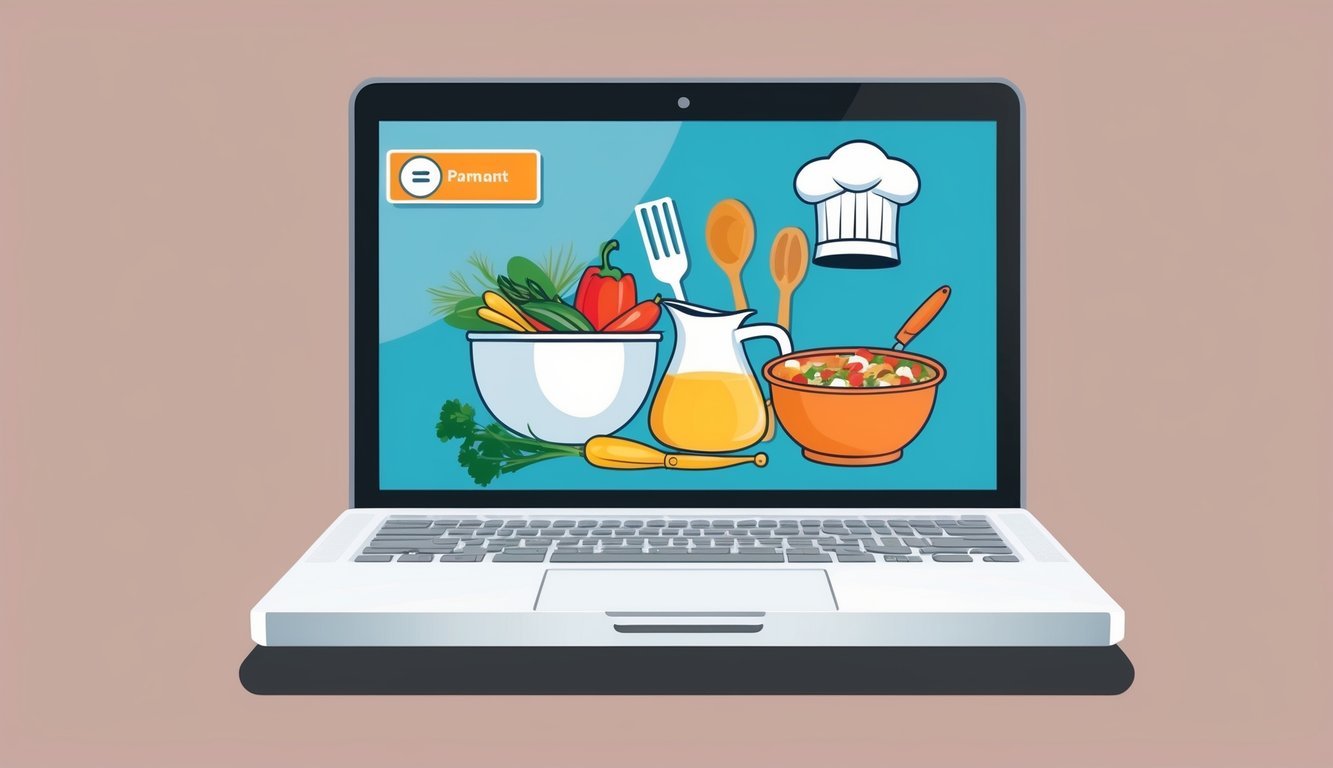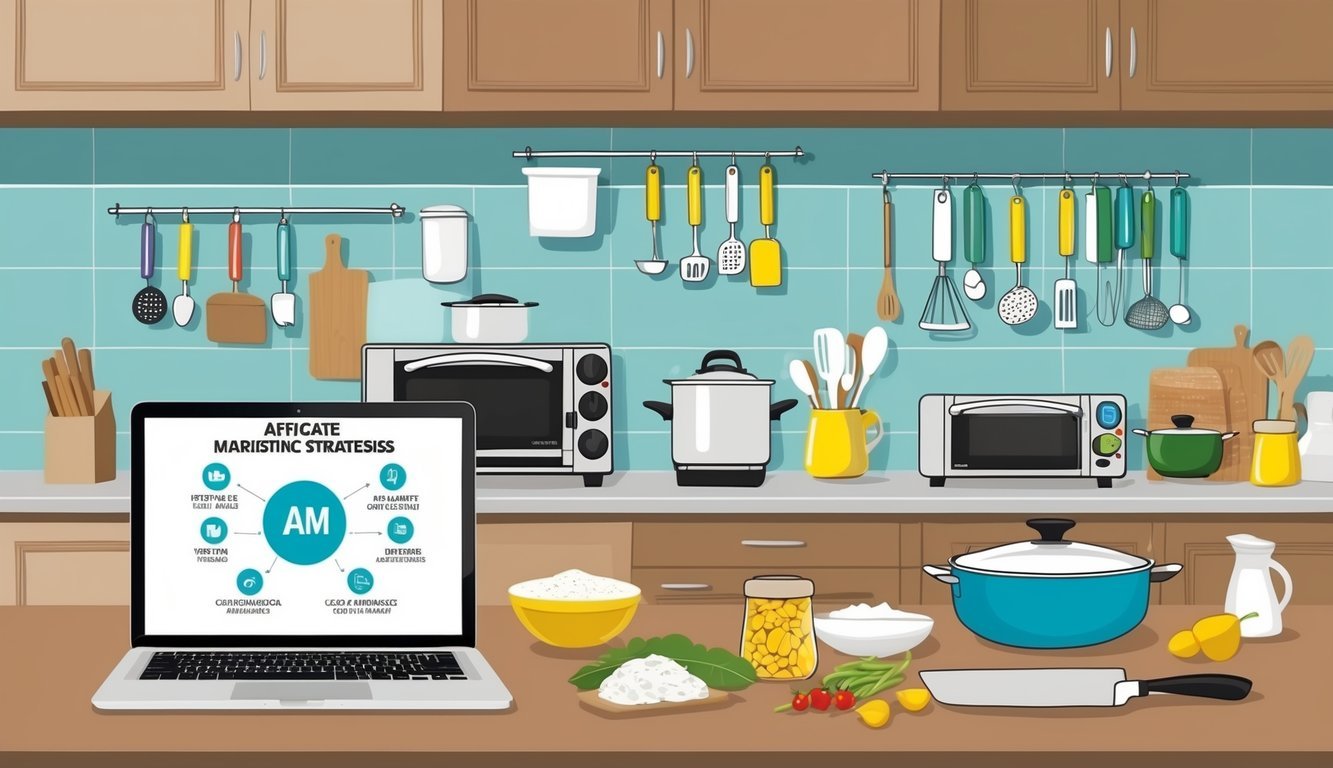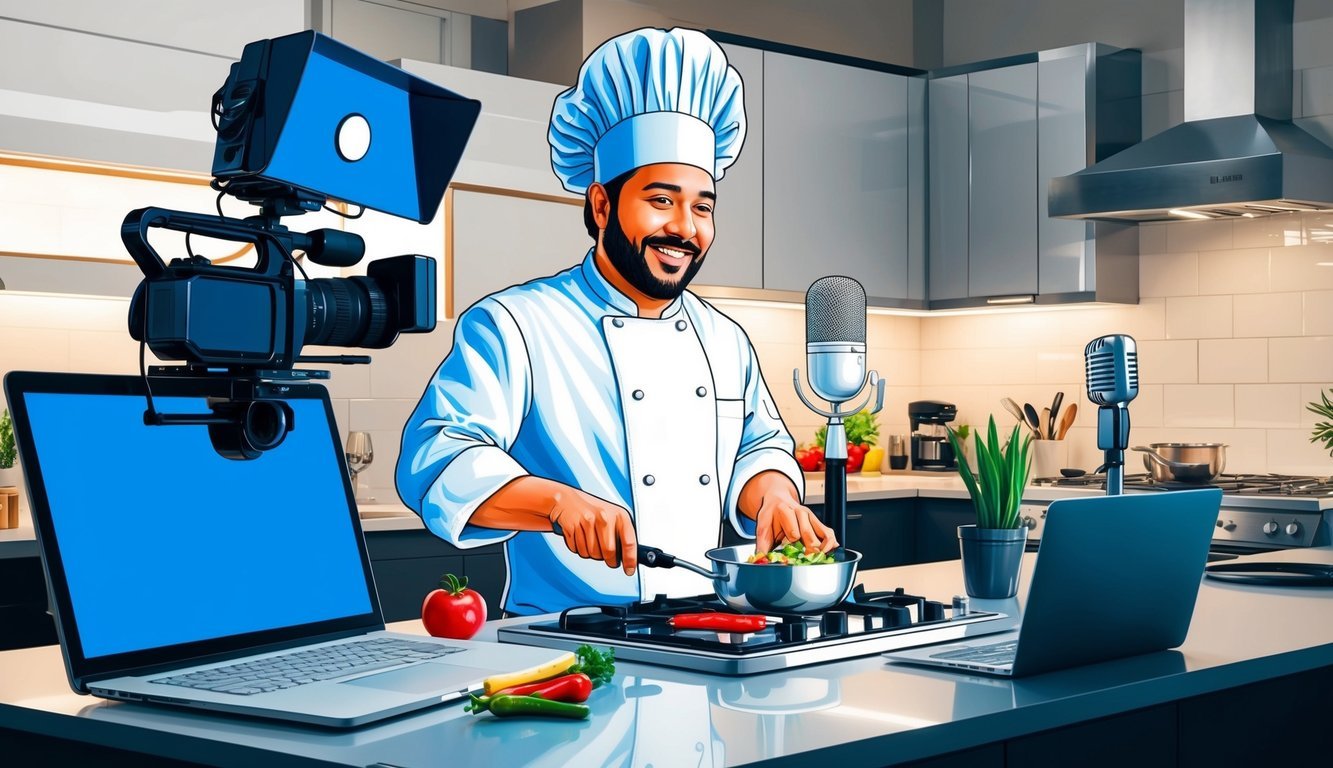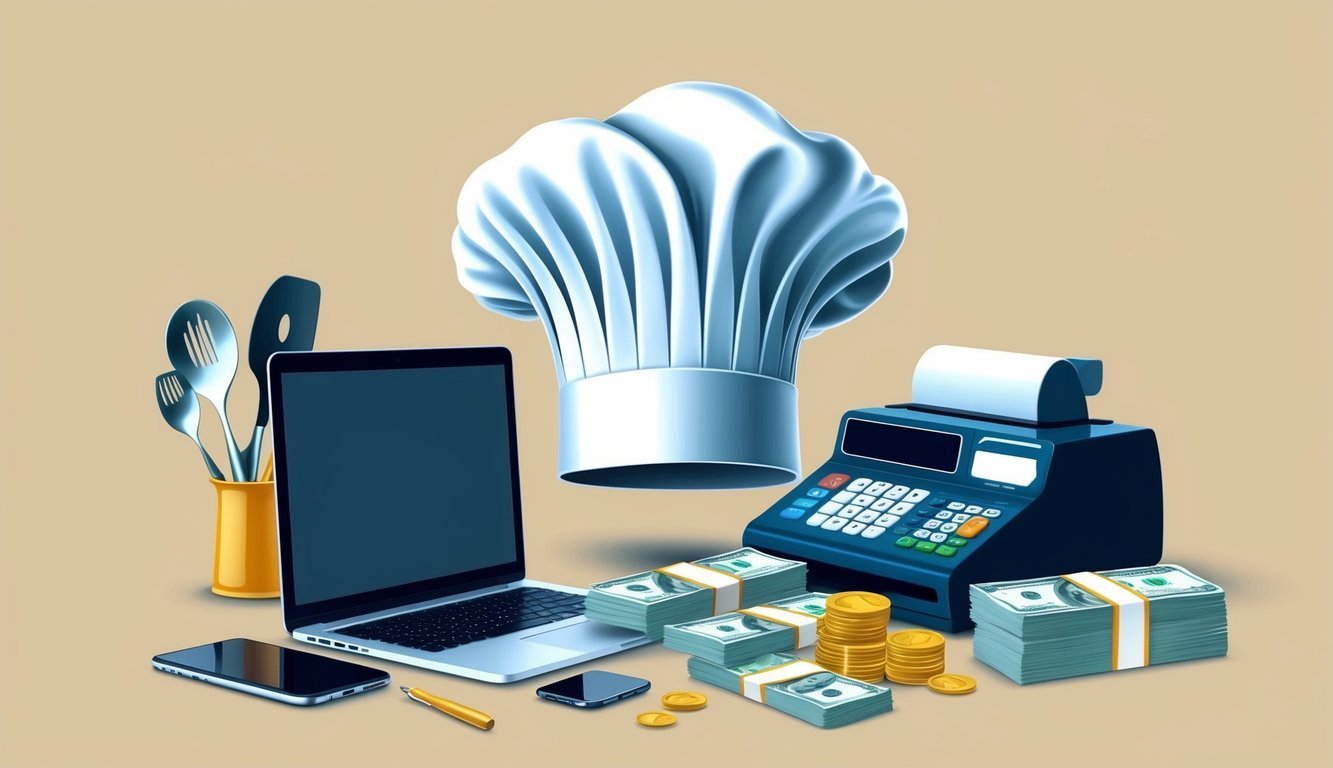Cooking is more than just a hobby – it can be a lucrative source of income.
The internet has opened up exciting opportunities for food enthusiasts to share their culinary skills and earn money from the comfort of their own kitchens.
You can turn your passion for cooking into a profitable venture without even leaving your home. Whether you’re an amateur cook or a seasoned chef, there are various ways to monetize your culinary talents online.
From selling recipes to teaching virtual cooking classes, the possibilities are diverse and accessible to anyone with a love for food and a willingness to share their expertise.
1) Start a YouTube Cooking Channel
Starting a YouTube cooking channel is an excellent way to showcase your culinary skills and potentially earn money.
Begin by defining your target audience and creating a niche for your channel.
Consider factors like age, gender, location, and dietary preferences of your ideal viewers.
Choose a unique angle for your content.
You might focus on quick weeknight meals, exotic cuisines, or budget-friendly recipes.
This will help you stand out in the crowded food content space.
Invest in quality equipment for filming.
Good lighting and clear audio are crucial for creating professional-looking videos.
You don’t need expensive gear to start, but ensure your content is visually appealing and easy to follow.
Consistency is key when building a YouTube channel.
Create a regular posting schedule and stick to it.
This helps viewers know when to expect new content and keeps them coming back for more.
Engage with your audience through comments and community posts.
Respond to questions and incorporate viewer suggestions into future videos.
This interaction can help build a loyal following.
Collaborate with other YouTube creators to expand your reach.
Guest appearances on each other’s channels can introduce you to new audiences and boost your subscriber count.
As your channel grows, explore monetization options like ad revenue, sponsorships, and merchandise sales.
Remember, building a successful YouTube cooking channel takes time and effort, but it can be a rewarding way to share your passion for cooking.
2) Offer Virtual Cooking Classes

Virtual cooking classes are a fantastic way to share your culinary expertise with people around the world.
With the rise of video conferencing platforms, you can easily connect with food enthusiasts eager to learn new recipes and techniques.
Set up a professional-looking kitchen space with good lighting and a clear view of your workspace.
Choose recipes that are suitable for online instruction and can be completed within a reasonable timeframe.
Consider offering both live and pre-recorded classes to cater to different schedules and preferences.
Live classes allow for real-time interaction and personalized feedback, while pre-recorded sessions provide flexibility for students.
Price your classes competitively based on the complexity of the recipes and your level of expertise.
You can offer individual sessions or package deals for a series of classes focused on specific cuisines or cooking techniques.
Promote your virtual cooking classes on social media platforms and cooking forums.
Create enticing visuals of your dishes and share snippets of your teaching style to attract potential students.
Engage with your audience during classes by answering questions and providing helpful tips.
Encourage participants to share photos of their finished dishes, fostering a sense of community among your students.
Consider partnering with local grocery stores or food suppliers to offer ingredient kits for your classes.
This can add value for your students and potentially create an additional revenue stream.
3) Create a Recipe Ebook

Creating a recipe ebook is a great way to monetize your cooking skills online.
Start by selecting a theme or cuisine type for your ebook.
This could be anything from quick weeknight dinners to vegan desserts.
Compile your best original recipes, ensuring they’re well-tested and easy to follow.
Include high-quality photos of the finished dishes to make your ebook visually appealing.
Format your ebook professionally using tools like Canva or Adobe InDesign.
Make sure it’s easy to read on various devices, including smartphones and tablets.
Price your ebook competitively, considering the value you’re offering and the prices of similar products in the market.
You can sell it directly through your website or use platforms like Amazon Kindle Direct Publishing.
Promote your ebook on social media, food blogs, and cooking forums.
Consider offering a free sample recipe to entice potential buyers.
Don’t forget to gather feedback from your readers.
Use their comments to improve future editions or create new ebooks tailored to their interests.
Remember to protect your intellectual property by including a copyright notice in your ebook.
This helps prevent unauthorized copying or distribution of your recipes.
4) Launch a Food Blog
Starting a food blog is an excellent way to monetize your cooking skills online.
You can share your recipes, cooking tips, and food-related experiences with a wide audience.
Choose a catchy name for your blog that reflects your culinary style or niche.
Select a user-friendly platform like WordPress or Wix to create your website.
Develop a content strategy that includes regular recipe posts, cooking tutorials, and food-related articles.
High-quality photos of your dishes are essential to attract and engage readers.
As your blog grows, you can monetize it through various methods.
Display ads are a common option, allowing you to earn money from visitor traffic.
Affiliate marketing is another popular strategy.
Recommend kitchen tools, ingredients, or food-related services you love, using affiliate links to earn commissions on sales.
Consider creating and selling digital products like e-cookbooks or meal plans.
These can provide a steady income stream once developed.
Collaborate with food brands for sponsored content or product reviews.
This can be lucrative as your blog gains popularity and authority.
Don’t forget to engage with your audience through comments and social media.
Building a loyal community can lead to more monetization opportunities in the future.
5) Sell Homemade Products on Etsy
Etsy provides a fantastic platform for selling your homemade culinary creations.
This online marketplace specializes in handmade and unique items, making it perfect for your cooking-related products.
Consider offering specialty foods like homemade jams, sauces, spice blends, or baked goods.
These items often have a longer shelf life and can be shipped easily.
Make sure to check local regulations regarding food sales before getting started.
You can also sell kitchen-related items that showcase your cooking skills.
Think about creating custom aprons, recipe cards, or even hand-painted cookware.
These products allow you to combine your culinary knowledge with other crafting talents.
When setting up your Etsy shop, take high-quality photos of your products.
Write detailed descriptions that highlight the unique aspects of your homemade goods.
Don’t forget to mention any special ingredients or techniques you use.
Pricing is crucial on Etsy.
Research similar items to ensure your prices are competitive while still allowing for a profit.
Factor in the cost of ingredients, packaging, and shipping when setting your prices.
Engage with your customers by responding promptly to questions and addressing any concerns.
Positive reviews can significantly boost your sales, so always strive to provide excellent customer service.
Remember to promote your Etsy shop on social media platforms.
Share behind-the-scenes content of your cooking process to build interest in your products.
This personal touch can help you stand out in the crowded online marketplace.
6) Become an Affiliate for Kitchen Products

Turning your cooking passion into profit can be as simple as recommending the tools you love.
Affiliate marketing allows you to earn commissions by promoting kitchen products to your audience.
Start by exploring cooking affiliate programs.
Many brands and online retailers offer these opportunities.
HelloFresh UK, for example, pays £8 per sale with a 30-day cookie duration.
Kitchen Universe is another option, offering a wide range of utensils, appliances, and cookware.
This variety gives you plenty of products to recommend to your followers.
Consider joining affiliate networks like Awin, which hosts programs like YesChef.
They offer a 10% commission rate and a 30-day cookie window.
Plus, you could earn monthly bonuses and increased commission rates.
By partnering with these affiliate networks, you can leverage their established reputation and targeted audience to maximize your earnings.
Furthermore, you can explore additional strategies to boost profits with online auctions, tapping into niche markets or collectibles that attract enthusiastic bidders.
This dual approach can create multiple revenue streams, enhancing your overall profitability and market presence.
To succeed, focus on products you genuinely use and love.
Share honest reviews, cooking demos, and tips that incorporate these items.
Your authenticity will resonate with your audience.
Remember to disclose your affiliate relationships to maintain trust.
Be transparent about earning commissions from purchases made through your links.
As you build your following, you might even attract higher-paying partnerships.
Some brands offer increased rates or exclusive deals to influential affiliates.
Building Your Online Presence

Establishing a strong digital footprint is crucial for monetizing your cooking skills online.
A well-crafted online presence helps you connect with your audience and showcase your culinary expertise.
Creating a Personal Brand
Define your unique culinary identity.
Choose a catchy name that reflects your cooking style or specialty.
Develop a logo and consistent visual aesthetic across your online platforms.
Craft a compelling story about your culinary journey.
Share what inspired you to start cooking and what makes your approach special.
Consider your target audience.
Are you catering to busy parents, health-conscious individuals, or gourmet food enthusiasts? Tailor your content and messaging to appeal to your ideal customers.
Utilizing Social Media Platforms
Select the right platforms for your brand.
Instagram and TikTok are great for visually appealing food content, while YouTube is ideal for longer cooking tutorials.
Post regularly and engage with your followers.
Respond to comments and create interactive content like polls or Q&A sessions.
Use relevant hashtags to increase your visibility.
Research popular food-related hashtags in your niche and incorporate them into your posts.
Collaborate with other food creators or influencers to expand your reach.
Cross-promotions can help you tap into new audiences and grow your following.
Engaging with Your Audience

Building a strong connection with your audience is crucial for monetizing your cooking skills online.
Interacting with followers and creating a sense of community can boost engagement and loyalty.
Developing Interactive Content
Create polls asking followers to vote on recipes you should make next.
This gets them involved in your content creation process.
Host live Q&A sessions where you answer cooking questions in real-time.
Share behind-the-scenes content of your recipe development process.
This gives followers a peek into your creative journey.
Post step-by-step photo tutorials for complex techniques.
Break them down into easily digestible chunks.
Encourage followers to share photos of dishes they’ve made using your recipes.
Feature the best ones on your page to foster a sense of community.
Building Community Through Feedback
Ask for honest feedback on your recipes and content.
Show you value your audience’s input by implementing their suggestions.
Respond promptly to comments and messages.
This shows you’re attentive and care about your followers’ experiences.
Create a private Facebook group or Discord server for your most engaged fans.
Share exclusive content and foster discussions there.
Host virtual cook-alongs where followers can cook a recipe with you in real-time.
This creates a shared experience and strengthens community bonds.
Organize challenges or contests related to your recipes.
Offer prizes to incentivize participation and boost engagement.
Frequently Asked Questions
Aspiring food entrepreneurs have many options to turn their culinary passion into profit online.
From teaching to selling products, the opportunities are diverse and accessible.
What are some creative ways to make money from home cooking?
You can start a YouTube cooking channel to showcase your recipes and techniques.
Another option is offering virtual cooking classes to teach others your skills.
Creating and selling a recipe ebook allows you to share your culinary knowledge with a wider audience.
How can I start selling my homemade food online?
Platforms like Etsy are great for selling homemade food products.
You’ll need to check local regulations on selling food from home.
Consider starting with shelf-stable items like jams, spice mixes, or baked goods that ship well.
What unique food products can I sell for a profitable online business?
Specialty condiments, artisanal baked goods, and gourmet snack mixes often sell well online.
Custom spice blends or meal kits can also be profitable.
Focus on products that are unique to your culinary style or local ingredients.
Can I earn an income by teaching cooking classes online?
Yes, you can earn money teaching cooking classes online.
Platforms like Zoom make it easy to host virtual classes.
You can teach specific cuisines, techniques, or even meal prep strategies.
Set competitive prices and promote your classes on social media.
What are some innovative food business ideas for food entrepreneurs?
Launching a food blog can be a great way to monetize your cooking skills.
You can earn through ads, sponsored content, and affiliate marketing.
Creating meal planning services or custom recipe development for clients are also innovative options.
What kind of food is the most profitable to sell from a home-based business?
High-margin items like specialty baked goods, artisanal preserves, and gourmet snacks tend to be profitable.
Foods with longer shelf lives reduce waste and shipping concerns.
Unique or hard-to-find products often command higher prices, increasing your profit potential.


